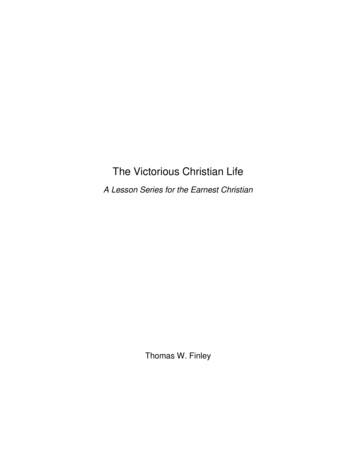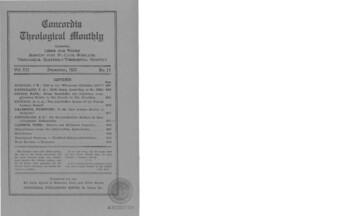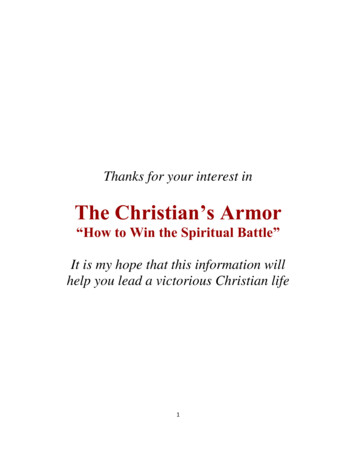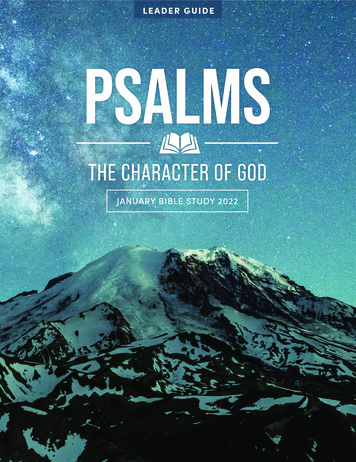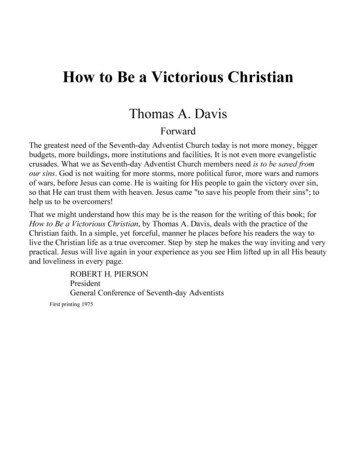
Transcription
How to Be a Victorious ChristianThomas A. DavisForwardThe greatest need of the Seventh-day Adventist Church today is not more money, biggerbudgets, more buildings, more institutions and facilities. It is not even more evangelisticcrusades. What we as Seventh-day Adventist Church members need is to be saved fromour sins. God is not waiting for more storms, more political furor, more wars and rumorsof wars, before Jesus can come. He is waiting for His people to gain the victory over sin,so that He can trust them with heaven. Jesus came "to save his people from their sins"; tohelp us to be overcomers!That we might understand how this may be is the reason for the writing of this book; forHow to Be a Victorious Christian, by Thomas A. Davis, deals with the practice of theChristian faith. In a simple, yet forceful, manner he places before his readers the way tolive the Christian life as a true overcomer. Step by step he makes the way inviting and verypractical. Jesus will live again in your experience as you see Him lifted up in all His beautyand loveliness in every page.ROBERT H. PIERSONPresidentGeneral Conference of Seventh-day AdventistsFirst printing 1975
ContentsPerspective and ObjectiveSomething LackingThe Turning PointNot by Spiritual OsmosisThe Terminal Cancer of SinIn BriefWillard Saxby and the LaodiceansThree Against One"What Greater Deception?"Not HypocritesNot a Hopeless CaseThe Irreducible MinimumPlain WordsNot a Modified or Rearranged LifeNine Signs of RegenerationThe One Who Helps Us CopeThree LawsThe Greatest Gift PromisedThe Fellowship of the SpiritThe Heart of the Matter"By Nature Children of Wrath""I Will Put Enmity""I Must Over-come"Trying to Obey Is Not ObedienceOne-hundred-eighty-Degree ChristiansA Man Named JohnTwo Definitions of ConversionJesus in the Central Place"If He Does Not Resist"Love Universal and ConstantA Battle in the Breast-Joined to His IdolsThe Substance andKeynote of Jesus' TeachingThe Divine HumiliationWhat the Father Asked, I AskGod Didn't Want IsaacThings and AttitudesContinual but CompleteDoes Surrender Mean Slavery?What Accepting Christ MeansPregnant With Eternal ConsequencesSame Man but DifferentBut I Don’t Want to Surrender!No Answers in Thirty MinuteWe Had Better Know JesusNot Found CasuallyThe Dull Becomes FascinatingStudy With OthersWhy Blessings Are LostThe Soul's Controlling FacultyResolving the BattleA Pivotal AreaEnergizing the WillFaith and an OrangeThe Simplicity of FaithPossessed by FaithA Definition of FaithOne Year Made the DifferenceDeveloping FaithConfidence, No Matter WhatWords of AssuranceA Question of FeelingsWhen We're Hungry We EatDealing With Undesirable EmotionsEmotions That Are Not SinfulFeelings Fought, Fade
Is Your Soul Breathing Properly?Extending Paul's MetaphorWhat "Pray Constantly" MeansAn Obstacle to Prayer"I Don't Feel Like Praying!"Don't QuitGod's Wants Rather Than OursThe Fourth Japanese MonkeyA Link in Sin's ChainExpel Temptation ImmediatelyNot a Mental VacuumExcluding Even Good ThingsClosed Minds, Open MindsTwo Fundamental LessonsThe Two LessonsBoth Lessons Must Be LearnedA Character That All Must PossessWas Satan Right?Satan's Perennial ChallengeAn Incredible Suggestion!Taking Another LookA Troubling ConceptPerfect in Our SphereTruth Versus FanaticismProving Satan WrongObjections to PerfectionMan's Blunted FacultiesAn AllegoryThe InterpretationProving Satan a LiarWhen the Christian "Misses the Mark"A Change in Mental PostureJustification Does Not Destroy SelfNeglected Prayer and StudyHow Character Is RevealedFocus on VictoryThe Effects of DefeatDefeat Is UnnecessaryOur Greatest StruggleVictories to Be GainedToo Many Gates to Watch?Ere the Gates CloseThe Guideposts Are UpPostscriptAppendix:Relevant QuotationsFrom the Spirit of Prophecy Writings
Perspective and ObjectiveVICTORY, victory in Christ, is what the Christian life is all about. Victory over any and every sin, every weakness, everyfailing, that is in the life.But many Seventh-day Adventists are conscious that they are not having complete victory in their lives. An informal surveyrecently conducted in one large Adventist church revealed that a sizable majority of the members were unsure of theirrelationship with Christ. This is not an indication of victory.I have known defeat in my Christian life. Long years of defeat. By defeat I do not mean temporary setbacks. I mean defeat,time and time again, in my struggle with sin.Briefly, my story is this: Baptized at 18, sincere in my desire to be a Christian, nevertheless I soon discovered my pre baptismweaknesses were still plaguing me. In spite of myself, I was weak in moral power, plagued by doubts, and under the control ofinherited and cultivated leanings to sin. Not sins as the world would count them, perhaps, but sins as God and I knew them tobe.My spiritual life in academy was a teeter-totter one. Fall and spring Weeks of Prayer frequently inspired me to holier living.But soon I would slip back to my old life of doubt and defeat.During World War II I joined the Royal Canadian Air Force and spent some two years in England attached to a Canadianbomber squadron as a medic.Following the war I went back to college; my goal, the ministry. In college I led a fairly active life as a theology student. Ipreached sermons at the college and nearby churches. I participated in public evangelistic meetings. I gave Bible studies.Something LackingBut there still was something lacking in my religious life.Outwardly I was probably what a ministerial student was expected to be. Inwardly there was an unlovely harem of feelings andattitudes-envy, jealousy, self-seeking, pride, un-Christlike ambition-that did not diminish with time, and that I could no moreget rid of than I could change the shape of my ears or the color of my eyes.In time I graduated and was called into the ministry. I served in several pastorates. I gave many Bible studies on the doctrinestaught by Seventh-day Adventists. But I could not lead a person to Christ. I could not because I did not really know Himmyself. Only a person who truly knows Jesus can lead others to Him.Meanwhile I married. In my opinion there is nothing more calculated to expose a person's character than marriage. Andespecially does true character emerge when children come into the home.With children, problems began to develop in our house. For example, my wife and I would have differences of opinionregarding how the children ought to be handled on various occasions. Sometimes there would 'be arguments. Afterward, Iwould go to my knees and ask for forgiveness and victory. And in a few days my wife and I would repeat our past performance.It was a merry-go-round we couldn't get off.The Turning PointThe turning point came the year we returned home after spending ten years in the mission field. My wife went to visit herparents and some of her brothers and sisters. She returned with a vision. She had seen in one of her sisters a spiritual glow,love, faith, an openness, hopefulness, and Christian victory that she felt she had to have.She began to search for a deeper life in Christ and to try to share her findings with me. The story of my resistings, and of myfinally admitting to myself that pride and self-importance was the reason for my attitude, cannot be told here. What is importantis that I finally began to follow some formulas and claim some promises. When I did, I began to discover something about howa person may have real victories in his Christian life.Which brings us to the objective of this book.
As the title tells us, this volume is intended to be a "how-to" book. It is intended, hopefully, to fulfill to some degree EllenWhite's words, "What the people want is instruction. What shall I do that I may save my soul?" Counsels to Writers andEditors, p. 25. I hasten to add, it is not a "do-it-yourself" book, for Christianity is not a "do-it-yourself" religion.While this is emphatically so, it is just as emphatically not a "do-nothing" religion. "The work of gaining salvation is one of copartnership, a joint operation. There is to be co-operation between God and the repentant sinner." The Acts of the Apostles, p.482.Cooperation suggests a plan accepted by the parties involved. Ellen White puts cooperation on a high level when she suggeststhere is a science to the plan of salvation. "The Bible contains the science of salvation for all those who will hear and do thewords of Christ." -Fundamentals of Christian Education, p. 187.In context, the term science suggests there are established principles in Christianity that may be discovered and understood, andthat, being faithfully adhered to, will result in freedom from sin, and finally the reality of eternal life. This is further suggestedin the familiar words of the Bible:"All scripture is inspired by God and profitable for teaching, for reproof, for correction, and for training in righteousness, thatthe man of God may be complete, equipped for every good work" (2 Tim. 3: 16, 17, R.S.V.).Not by Spiritual OsmosisSalvation, then, is not obtained by some sort of spiritual osmosis, or because God is very gracious and reluctant to destroysinners-which is, of course, true-but because the sinner cooperates with certain spiritual principles.This joint cooperation is not a haphazard, hit-or-miss, accidentally accomplished enterprise. The road to heaven is notdiscovered, or continued upon, by luck. We do not step into it by some mysterious providence guiding our feet in spite of ourrebelliousness, carelessness, neglect, or indifference. We shall not walk at last through the gates of the city beyond the starsbecause we happened to drift at random into the company of those who shall walk there. Blind chance has absolutely no part toplay in salvation. 1On the contrary, those who walk in triumph through heaven's wide-swinging gates will do so because they will have gained thevictory over the world, the flesh, and the devil. And to do so will take everything they have.No one will be borne upward without stern, persevering effort in his own behalf. All must engage in this warfare forthemselves. Individually we are responsible for the issue of the struggle; though Noah, Job, and Daniel were in theland, they could deliver neither son nor daughter by their righteousness. -Testimonies, vol. 8, pp. 313, 314.We have great victories to gain, and a heaven to lose if we do not gain them. -Ibid., vol. 5, p. 267.In pondering my approach to this book I recognized a problem-indeed, a danger-inherent in writing a manuscript of this nature:the problem of balance and the danger involved in imbalance.A certain emphasis will be found in this book because of the very nature of my subject. This emphasis could lead tomisunderstanding on the part of some. The apostle James, in his accentuation of works in his theme of working faith, causedMartin Luther to belittle his letter as "an epistle of straw." Others have had similar problems with James. And there are thosewho have problems with other parts of the Holy Scriptures for similar reasons.Moreover, I remember Ellen White's caution to "Brother K," as found in Selected Messages, book 1, pages 176, 177. Heradmonitions there regarding the expressing of ideas in such a way as to be misunderstood and to cause problems must be takenvery seriously.In writing, I recalled words by Konrad Adenauer, former Chancellor of West Germany: "We are all under the same sky, but wedon't all have the same horizon."This book is written from the particular point where I see the horizon. It is penned as growing from my study, my observations,my experience. In doing this, I have tried to keep my eyes as much as possible away from the horizon, and toward the sky thatcovers us all. I have also tried to look beyond the sky we see, to Him who knows and respects us all as individuals,remembering at the same time that His conditions and standards are immovable, eternal.
The Terminal Cancer of SinHaving said this, let me add to this chapter this thought: Early in his final book, Stay of Execution, the late eminent journalistStewart Alsop tells of being a patient at the National Institutes of Health, Bethesda, Maryland, suffering from leukemia.Wandering around one day on his floor, he entered a staff room where he saw a sign not meant to be seen by patients: ALLPATIENTS MUST HAVE INCURABLE CANCER. ALL PATIENTS MUST BE FRANKLY INFORMED OF THEIR CASE.Reading the sign, Mr. Alsop felt "a dark pit of fear" inside.Stewart Alsop died of cancer.Can we face this fact for a moment? We are all suffering from the terminal cancer of sin. We are all sinners, and "the soul thatsinneth, it shall die."We can be treated with soft, reassuring, don't-get-excited, don't-be-concerned words-and die in our sins. Or we can be told,without deception, clearly, what our problem is." 2In physical cancer it will be recognized that the physician may tell his patient ever so gently and compassionately of hisdisease. But the news is still going to be traumatic. But in spiritual cancer we can be told of the tremendous remedy that isfound in the Lord Jesus, and how that remedy works 100 per cent for us if we will faithfully place ourselves into the hands ofthe Great Physician.So I decided to describe plainly, depending upon the Bible and the Spirit of Prophecy, what seems to be the difficulty of manyof us who are church members. I do this so that, like the patients in the cancer ward of the National Institutes of Health, wemight understand the gravity of our situation. When we do this it is possible for us to see the importance of availing ourselvesof the glorious remedy provided.In a book of this nature, besides the problems already referred to, there is the problem of what to include. Some readers mayfeel I have written too much on one phase of my subject; others, that I have written too little. Some may think I have left outmaterial that should be included; others, that I have included matter that should be left out. In any case, I have written from myown perspective with the objective, hopefully, of helping some reader find a meaningful, victorious relationship with Jesus.In BriefVictory connotes struggle. The word has no meaning apart from struggle. So this book is about the Christian's struggle thatleads to final victory.The Christian warfare is not lightly, and must not be ignorantly, entered into. "What king," asked Jesus, "going to encounteranother king in war, will not sit down first and take counsel?" (Luke 14:31, R.S.V.).In this book we shall be taking a candid look at our assets and liabilities, with liabilities examined first. They may look largeand discouraging. We shall also consider what is required of us before we can really begin to gain victories. We may considerthis rather big, also.Then we shall consider our allies, and shall discover that with them we cannot possibly lose the war.Following this, looking at methods and means by which victory is gained, we shall discover great demands, but greaterpossibilities, and still greater potential conquests that climax in the glorious and triumphant event described by the revelator:And after this I beheld, and, 10, a great multitude, which no man could number, of all nations, and kindreds, andpeople, and tongues stood before the throne, and before the Lamb, clothed with white robes, and palms in theirhands; and cried with a loud voice, saying, Salvation to our God which sitteth upon the throne, and unto theLamb . And one of the elders answered, saying unto me, What are these which are arrayed in white robes? andwhence came they? And I said unto him, Sir, thou knowest. And he said to me, These are they which came out ofgreat tribulation, and have washed their robes, and made them white in the blood of the Lamb. Therefore are theybefore the throne of God, and serve him day and night in his temple: and he that sitteth on the throne shall dwellamong them. They shall hunger no more, neither thirst any more; neither shall the sun light on them, nor any heat.
For the Lamb which is in the midst of the throne shall feed them, and shall lead them unto living fountains of waters:and God shall wipe away all tears from their eyes (Rev. 7:9-17).1 See Appendix (p. 157) for Spirit of Prophecy statements indicated by superior figures.Willard Saxby and the LaodiceansACCORDING to the Seventh-day Adventist Yearbooks for 1890 to 1894, Willard H. Saxby, an ordained minister of theSeventh-day Adventist Church, served in Ohio during those years. He may have ministered there as late as 1902 or 1903.During those years no Yearbooks were published. Consequently, we cannot be sure when he moved from Ohio to WashingtonState, where his address is listed in the 1904 Yearbook.Sometime during the five or six or more years Elder Saxby worked in Ohio, Ellen White wrote a letter that told him somethings about himself he had trouble seeing and accepting.Elder Saxby received the testimony during a camp meeting he was attending in Ohio. It was part of a letter dealing with othermatters, sent in care of a leading brother. The testimony for Elder Saxby was delivered to him following the close of one of theevening meetings.While the other minister, whom Elder Saxby refers to as Elder A, and he sat together in the latter's tent, Elder A asked ElderSaxby whether he believed in the Testimonies. To this question Saxby answered decidedly in the affirmative. Then, after theyhad prayed together, Elder A slowly read the letter, which was in Mrs. White's handwriting.The manuscript was eleven pages long. The first five were for Elder Saxby personally.After Elder A had read a few paragraphs he came to a statement to which Saxby strongly objected. "That is not so!" heexclaimed, emphatically."Brother Saxby, you say it is so, and the Lord will help you to see that it is so.""But how can I say a thing is so when I know it is not so?" Elder Saxby protested."Brother Saxby, you say it is so, and the Lord will help you to see that it is so," Elder A repeated. With that he continuedreading.A page or so farther along Elder A read another statement to which Willard Saxby objected, "That is not so!"Again Elder A answered the protestation by saying substantially what he had said before. Then, after making a few otherobservations, he began to read the letter again.There were four personal statements in the letter to which Willard Saxby took exception. On the first he was especiallypositive.The letter finished, Elder Saxby received permission to take it home and return it the next day.When he got to his room Willard Saxby found his wife in bed, but awake, anxiously wondering what had detained him. Whenhe told her his experience she asked him to read the testimony from Sister White. He demurred, saying it was too late to read itall. But he agreed to share with her the one paragraph with which he had his greatest problem. Before he read it he told his wifethat he had insisted to Elder A that what Sister White had written was not so.The statement in question had to do with a matter between Saxby and his wife. After he had read it, Mrs. Saxby abruptly sat upin bed and, emphatically pointing her finger at him, said with all the earnestness of which she was capable, "Willard, that isso!"
Three Against OneDescribing his reaction to his wife's exclamation, Elder Saxby wrote:I began to reason very seriously, like this: My wife says it is so; and Elder A, because of his confidence in the Spirit ofProphecy, says it is so; and, above all, the Lord through His servant says it is so: it must be so--three against one.As I sought the Lord by fasting and prayer, I soon saw things in the true light. The testimony was a photograph ofmy inner life, and I could see that it was. -Review and Herald, May 18, 1916.Let us leave Willard Saxby for a little and consider another matter.Picture a man walking down a street naked, blindly groping around, not knowing where he is or where he is going---.a mostpitiable wretch indeed.But when he is approached by a concerned would-be benefactor, he says, "I am rich! I am doing very well. I have everything Iwant."We would hardly know what to make of such a person.But suppose that, instead of one man, there were a hundred, a thousand, a million in that miserable condition, all protesting, "Iam rich. I have prospered. There is nothing I need."The idea is, of course, too preposterous to think about seriously. How could a single normal person, to say nothing of scores, orthousands, or more, be wretched and not know it? How could he be miserable and totally unaware of it? Poor, and think himselfprosperous? Blind and naked, fancying that he could see and that he was clothed?We say again, the idea is too preposterous to consider seriously.Or is it?We hesitate to make an application, but Inspiration does it for us.To the angel of the church in Laodicea write: . You say, I am rich, I have prospered, and I need nothing; notknowing that you are wretched, pitiable, poor, blind, and naked" (Rev. 3:14-17, R.S.V.).The Laodicean message applies to the people of God who profess to believe present truth. The greater part arelukewarm professors, having a name but no zeal. -Testimonies, vol. 4, p. 87.The message to the Laodiceans is applicable to Seventh-day Adventists who have had great light and have notwalked in the light. It is those who have made great profession, but have not kept in step with their Leader, that willbe spewed out of His mouth unless they repent. --Selected Messages, book 2, p. 66.Diagrammatically, then, the Laodicean message may be depicted like this:As with other passages of the Bible and the Spirit of Prophecy we have examined, the implications of this picture are solemn.For we read, "Because thou art lukewarm . I will spue thee out of my mouth" (Rev. 3: 16). Says The SDA Bible Commentaryon the text: "The figure of tepid water is pressed to its logical conclusion. Such water is disappointing and nauseating, and theone who drinks it almost involuntarily expels it."I must ask myself, In which of the three groups am I? The cold, lukewarm, or hot? 3
"What Greater Deception?"What greater deception can come upon human minds than a confidence that they are right when they are all wrong!The message of the True Witness finds the people of God in a sad deception, yet honest in that deception. Theyknow not that their condition is deplorable in the sight of God. While those addressed are flattering themselves thatthey are in an exalted spiritual condition, the message of the True Witness breaks their security by the startlingdenunciation of their true condition of spiritual blindness, poverty, and wretchedness. The testimony, so cutting andsevere, cannot be a mistake, for it is the True Witness who speaks, and His testimony must be correct. -Testimonies,vol. 3, pp. 252, 253.The Ellen G. White Comments in the message to the Laodicean church in volume seven of The Seventh-day Adventist BibleCommentary comprise some eight pages (pp. 959-967). In these pages are found more than a score of words and phrases thatshe used to describe the Laodicean condition. Other descriptions may be found in other places in her writings.Each individual church member is called upon to examine frankly and prayerfully his own religious experience in the light ofthese descriptions. Among them are: "selfishness"; "destitute of . meekness"; a "tame, lifeless, emotionless religiousexperience"; "halfhearted Christians"; "self-sufficiency"; "spiritual self-deception"; the taking of a "noncommittal position" inspiritual things; lacking lowliness; satisfied in their own "self-security"; "selfish egotism"; "self-exaltation"; "hypocrisy"; "selflove"; "vain conceit"; "willfully ignorant"; "indulgence of pride"; "covetousness"; "worldly ambition."These are stark, flinty, brutally frank observations. "The testimony of the True Witness is not a smooth message." Testimonies,vol. 3, p. 257. It is a "fearful message" (ibid., vol. 1, p. 186). We rebel at making personal applications. Our instinct is to turnfrom them and to think of more pleasant things, or to decide they do not apply to us.But dare we so quickly push them aside? Only, perhaps, at the peril of our souls.Let us turn to another message brought to the church of the last days by the Lord.In Matthew 25: 1-13 is recorded Christ's parable of the ten virgins, which virgins represent those who await His return.Invited to a wedding, which in the East frequently was held at night, the ten maidens took their lamps with them. But fiveneglected to take sufficient oil. The hour began to grow late; yet the bridegroom had not come, so all ten went to sleep.Then, at midnight, a shout went up, "Look, the bridegroom is coming. Go out to meet him."Startled, the ten awoke and looked at their lamps. Then the foolish maidens were dismayed to discover that their lamps weregoing out, and they had no oil in their flasks. An appeal to the other five for oil brought refusal-they had only enough forthemselves.Greatly worried, the five hastened to find oil. But, when they returned to the house where the marriage was being held, theyfound the door closed and locked. Their urgent call to be let in only brought the chilling response from the bridegroom, "I tellyou, I do not know you."This parable applies to the Laodiceans who do not heed the warnings and invitations that come to them to secure the oil, whichis "the righteousness of Christ. It represents character, and character is not transferable." -Testimonies to Ministers, p. 234.Finally they awake and endeavor to correct their mistake, to remodel their characters. But, unutterably sadly, it is too late!Probation has closed. 4Not HypocritesBut notice:The class represented by the foolish virgins are not hypocrites. They have a regard for the truth, they have advocatedthe truth, they are attracted to those who believe the truth; but they have not yielded themselves to the Holy Spirit'sworking. They have not fallen upon the Rock Christ Jesus, and permitted their old nature to be broken up. -Christ'sObject Lessons, p. 411.
Continuing, Ellen White says:The class represented by the foolish virgins have been content with a superficial work. They do not know God. Theyhave not studied His character; they have not held communion with Him; therefore they do not know how to trust,how to look and live. -Ibid.The condition of the Laodiceans and the ten virgins is essentially the same, except that the parable describes their conditionwhen probation closes.The Laodiceans are not "cold," meaning they are not totally rebellious. It is not that they never made a profession ofChristianity; they are just not "hot," not fully given over to God. They are "lukewarm," uncommitted, unsurrendered to God."The message of the True Witness finds the people of God [the Laodiceans] in a sad deception, yet honest in that deception."-Testimonies, vol. 3, p. 253. The parallel description of the ten virgins is that they are not hypocrites, but have been contentwith a superficial work. Like theLaodiceans, they are in an uncommitted, unsurrendered condition.Willard Saxby was at first positive that the message from Ellen White did not apply to him, that she was mistaken. But therealization that she, his wife, and Elder A all felt that it did, caused him soberly and seriously to examine himself. As a result ofhis consequent examination of his heart and life, he was led to the conclusion that the message did indeed apply to himself.We, the Seventh-day Adventist people today, may be tempted to feel that the Laodicean message in it interpretation andapplication in the Spirit of Prophecy writings does not apply to us, personally. To Brother Jones and Sister Smith, possibly. Butto me! 5Ellen White stated that the message applies to "the greater part" of the church. Note: The message is recorded in Scriptures forthe last church, for us who are living today. The messenger to the remnant church states that it applies to us. Does myconscience, and does yours, suggest that perhaps the message does apply to us, personally? Three to one?"Examine yourselves: are you living the life of faith? Put yourselves to the test" (2 Cor. 13:5, N.E.B.).*Determine to know the worst of your case. Ascertain if you have an inheritance on high. Deal truly with your ownsoul. -Testimonies, vol. 1, p. 163.With fasting and earnest prayer, with deep heart searching, stern self-examination, lay bare the soul; let no actescape your critical examination. -Ibid., vol. 2, p. 158.Those who have no time to give attention to their own souls, to examine themselves daily whether they be in thelove of God, and place themselves in the channel of light, will have time to give to the suggestions of Satan and theworking out of his plans. Selected Messages, book 2, pp. 20, 21.Not a Hopeless CaseThe Laodicean message is not a hopeless case but a most sobering one.But the counsel of the True Witness does not represent those who are lukewarm as in a hopeless case. There is yet achance to remedy their state, and the Laodicean message is full of encouragement; for the backslidden church mayyet buy the gold of faith and love, may yet have the white robe of the righteousness of Christ, that the shame of theirnakedness need not appear. Purity of heart, purity of motive, may yet characterize those who are half-hearted andwho are striving to serve God and Mammon. They may yet wash their robes of character and make them white inthe blood of the Lamb. -Review and Herald, Aug. 28, 1894.The True Witness faithfully diagnoses the case and prescribes the remedy: the white raiment, the righteousness of Christwrought out in the character; gold, faith in God; and eyesalve, which is God's Word. This "salve" "makes the conscience smartunder its application; for it convicts of sin. But the smarting is necessary that the healing may follow, and the eye be single tothe glory of God." -The SDA Bible Commentary, Ellen G. White Comments, on Rev. 3: 18, p.96
How to Be a Victorious Christian , by Thomas A. Davis, deals with the practice of the Christian faith. In a simple, yet forceful, manner he places before his readers the way to live the Christian life as a true overcomer. S

